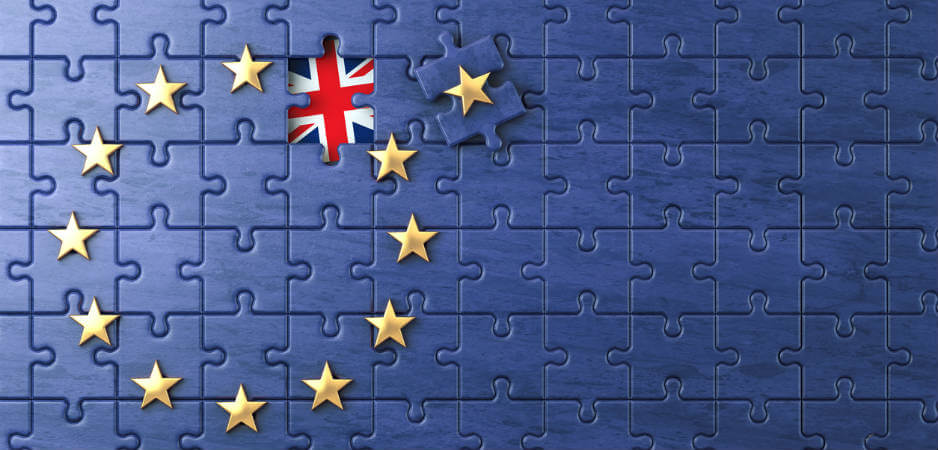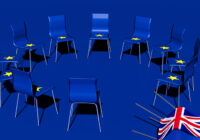Triggering Article 50 sets the clock running for the Brexit negotiations. It is the start of an unprecedentedly challenging period.
Now that Theresa May, the British prime minister, has triggered Article 50, the process of formally negotiating Brexit can begin. Here’s what to expect in the next two years.
First, the European Union-27 (EU-27) will acknowledge the notification. The EU-27 will then focus on adopting “guidelines” for the negotiations. Determining these will be the responsibility of the European Council, so the leaders of the EU-27 member states, the president of the European Commission, Jean-Claude Juncker, and the European Council president, Donald Tusk.
To adopt the guidelines, the European Council will meet—minus the United Kingdom—in extraordinary session on April 29, 2017.
The guidelines are expected to set out some basic principles, including the need to accept the free movement of goods, services, capital and people for access to the single market. They will also set out the issues that the EU 27 will insist are covered in the withdrawal agreement. That will include: the UK’s financial liabilities—so money it owes, for example, to cover the pensions of EU officials; the rights of EU citizens currently in the UK; transitional funding arrangements; and the nature of the new EU-UK frontiers—particularly the land border in Ireland.
The guidelines will also confirm who will be negotiating on behalf of the EU-27—which means they will make formal the role of Michel Barnier as the European Commission’s chief negotiator. They will set out where negotiations will take place (Brussels); and the sequence of negotiations.
Once the guidelines have been adopted, attention will shift to the EU-27 in the council and the adoption of the formal mandate for negotiations. This will provide Barnier and his task force with the detailed instructions they need to carry out negotiations with the UK.
With the mandate adopted—probably not until late May 2017—negotiations will be opened. For the UK, these will be led by David Davis, secretary of state for exiting the European Union. Day-to-day negotiations are expected to be led by the permanent secretary in the Department for Exiting the European Union (DExEU), Oliver Robbins.
The UK government is eager to see the negotiations focus from the outset on the future, post-Brexit UK-EU relationship. It is the EU-27, however, that will determine the sequencing of the negotiations.
The EU’s priority is determining the terms of withdrawal, including any UK financial liabilities. It will only be willing to move on to talks about future UK-EU relations once these terms have been broadly agreed. The new relationship will be the subject of a further set of negotiations which formally cannot begin until the UK has left the EU.
Reaching Agreement
Article 50 envisages two years for agreeing the terms of the UK’s withdrawal. Whether this will be sufficient remains to be seen. Much will depend on whether and to what extent the EU-27 can reach agreement among themselves.
Formally, only a qualified majority of member states—20 member states representing 65% (289.5m) of the population (445.5m) of the EU-27—is required. In practice, it is expected that the EU-27 will proceed on the basis of consensus.
The option does exist to extend the two-year period, although this would require unanimous agreement of the EU-27 and the UK. The negotiations proper cannot, however, last the full two years. Sufficient time needs to be set aside, once political agreement has been reached on the terms of withdrawal, for the definitive legal text of what has been agreed to be drawn up and finalized. That text will also need to be translated into each of the EU’s other 23 official languages and those versions of the text agreed.
There will then be a signing ceremony before the terms of withdrawal are presented to the European parliament for its “consent” that requires a simple majority of MEPs to vote in favor.
The agreement will also be considered by the UK Parliament, where both houses will have a vote on whether to adopt it or not. The UK government has committed to holding these votes before the European Parliament debates the agreement.
Finally, assuming the European Parliament votes in favor of the terms agreed by the House of Commons and House of Lords, the EU-27 will, through a qualified majority vote in the European Council, formally “conclude” the terms of withdrawal. The UK will then leave the EU on the date on which the agreement enters into force. That date could be one beyond the initial two years for negotiation set out in Article 50.
If no agreement is reached within the two years and there is no agreement to extend the two-year period, the EU treaties will cease to apply to the UK two years after the date the British prime minister issues the notification of intention to withdraw. The UK’s membership of the EU will simply lapse.
With notification on March 29, 2017, and allowing a month for each of the various post-negotiation stages, agreement will have to be reached on the terms of withdrawal and any transitional arrangements in preparation for the new post-Brexit UK-EU relationship by November 2018 if the whole process is to be wrapped up within the two years provided for in Article 50.
Barnier has indicated he wishes to see the negotiations completed by October 2018. Autumn 2018 will therefore be a crucial period in the negotiations.
Beyond Article 50
The timeframe is extremely tight and may well prove insufficient. Moreover, the UK government will be involved in other negotiations as well.
For starters, it will be looking to begin pre-negotiations on its future relationship with the EU. Simultaneously it will be seeking to establish its own “tariff schedules” with the World Trade Organization (WTO) so that it can start trade negotiations with third countries and have those deals in place as soon as possible after Brexit.
It will also have to negotiate with the devolved administrations in Belfast, Cardiff and Edinburgh about what happens to powers that will be “repatriated” from the EU.
Triggering Article 50 sets the clock running for the Brexit negotiations. It is the start of an unprecedentedly challenging period.
*[This article was originally published by The Conversation.] ![]()
The views expressed in this article are the author’s own and do not necessarily reflect Fair Observer’s editorial policy.
Photo Credit: Bet_Noire
Support Fair Observer
We rely on your support for our independence, diversity and quality.
For more than 10 years, Fair Observer has been free, fair and independent. No billionaire owns us, no advertisers control us. We are a reader-supported nonprofit. Unlike many other publications, we keep our content free for readers regardless of where they live or whether they can afford to pay. We have no paywalls and no ads.
In the post-truth era of fake news, echo chambers and filter bubbles, we publish a plurality of perspectives from around the world. Anyone can publish with us, but everyone goes through a rigorous editorial process. So, you get fact-checked, well-reasoned content instead of noise.
We publish 2,500+ voices from 90+ countries. We also conduct education and training programs
on subjects ranging from digital media and journalism to writing and critical thinking. This
doesn’t come cheap. Servers, editors, trainers and web developers cost
money.
Please consider supporting us on a regular basis as a recurring donor or a
sustaining member.
Will you support FO’s journalism?
We rely on your support for our independence, diversity and quality.







